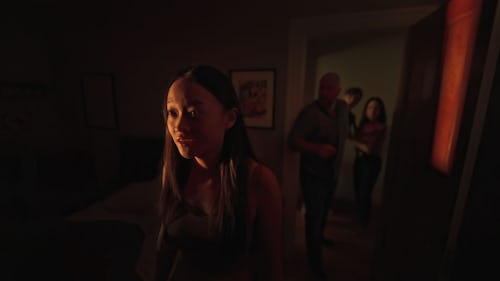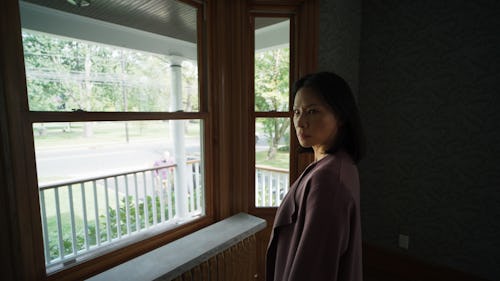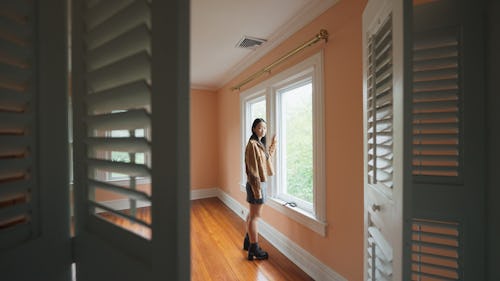
A cavernous house sits empty. The camera sits motionless from within a closet, its frame fixed on a window straight across from it. Suddenly, it moves, gliding to look out the window. It’s daylight — cars drive through a sunny suburban street, crickets chirp, the faint sound of kids trail through the air. But the camera seems to shrink away from the window, as if frightened. It glides through the rest of the house, weaving through wood-paneled hallways, before pausing in front of an old, rusty mirror. As the minutes pass, it makes its way back to the closet, as if waiting for … something.
It’s not long before its patience is rewarded: a family enters, led by a realtor showing them the house. The parents (Lucy Liu and Chris Sullivan) and their two teen kids, Chloe (Callina Liang) and Tyler (Eddy Maday), are looking to make a fresh start after Chloe had suffered some unknown trauma. The camera seems to perk up upon seeing the family, taking a particular interest in Chloe, who jerks out of her grief-stricken haze when she senses something hovering over her shoulder.
It’s a striking opening for Steven Soderbergh’s Presence, a horror movie both defined by and burdened by its unique gimmick: a haunted house movie from the point of view of the ghost. But despite how game Soderbergh is to give this gimmick its due, screenwriter David Koepp’s barebones script and the casts’ somewhat shaggy performances result in Presence fading from the mind soon after it ends.

It’s quickly revealed why the entire family walks on eggshells around Chloe: not too recently, two of her close friends had died from apparent drug overdoses, a one-two punch of trauma that has left Chloe listless and despondent. Chloe’s apathy frustrates her Type-A mom, Rebecca (Liu, brute-forcing her way through a relatively thankless role), and earns the ire of her jock brother Tyler, who is eager to climb the social ladder at their new school. The only one sympathetic to her plight is her dad, Chris (Sullivan, giving a sweet and gentle turn), and ironically, the ghost that appears to haunt their house. Chloe’s trauma also seems to have given her a sixth sense, leading her to become convinced there is a “presence” in this house, and that it’s trying to communicate with her. However, by the time the rest of the family comes around to her side, things have taken a violent turn.
POV movies have always been relatively hit-or-miss — if they’re too energetic and frenetic, they run the risk of feeling like a video game, if they’re too slow, they risk putting the viewer to sleep. If done well, like the current Oscar-contender Nickel Boys, they can jar you into a one-of-a-kind cinematic experience. Soderbergh, who also acts as the movie’s cinematographer, smartly finds the middle point, mixing up tight close-ups with slow, lingering wide shots to lull the viewer into a kind of hypnotic state. And his camera never stops moving, dipping and weaving through the house (though it seems to mostly follow the rules of physics and never goes through walls). But it’s not the POV that ultimately drags down this movie.
Presence falls very much under the umbrella of “experimental Soderbergh” playing with form in a way that’s brazen and bold, even if it doesn’t always work. In many ways, it feels like a return to his early independent movies and its slightly sleazy twists, coupled with the fascination with the digital world of his late-career films. But one thing that Presence doesn’t have is a movie star that provides an anchoring, well, presence.

Though Soderbergh is synonymous with the independent cinema movement, the director is at his best when he’s working with the best of the best movie stars — whether it be the pairing of Clooney and Pitt in his star-studded Ocean’s movies, or even smaller, low-budget fare like the Zoë Kravitz-led Kimi. In Presence, Liu is far and away the movie’s biggest star, but the character’s prickly unlikability and hostile attitude towards the film’s actual protagonist, Chloe, only alienates the audience.
Newcomer Callina Liang, to be fair, is terrific — haunted and soulful, while still displaying the haughty attitude of a teenage girl. But some of the supporting performances, including Eddy Maday as her brother Tyler and West Mulholland as Ryan, Chloe’s intensely angsty love interest, are a little rough around the edges.
The POV gimmick surprisingly manages to stay compelling throughout the film’s 85-minute runtime, though it sometimes feels limiting when it comes to exploring the film’s larger themes. The grief that Chloe feels, and the way that her trauma seeps into the cracks of the family until they begin to fall apart, is a fascinating thread that the film doesn’t follow through with, preferring instead to take a hard-left turn with its violent twist. It’s a shame, as Presence is frequently moving and haunting, touching on the real pain of losing loved ones and how grief follows us like a presence we can see just out of the corner of our eye. Presence is its gimmick — a fun experimental detour for Soderbergh as he tries out some new cinematography techniques on the way to his next star-studded film. It doesn’t quite revolutionize the haunted-house movie, but it could have.
Presence opens in theaters January 17.
FTTT
0 Comments